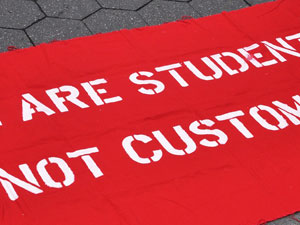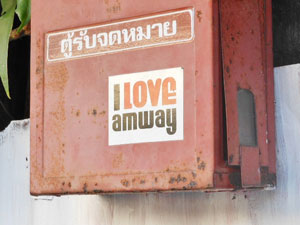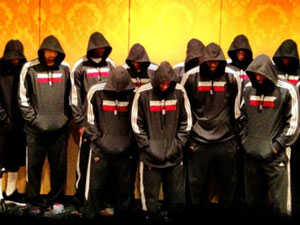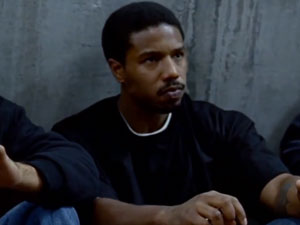
Interns’ Favorite Articles of the Week (7/19/13) Interns’ Favorite Articles of the Week (7/19/13)
This week: the effects of climate change on animals, radical fundamentalists in Egypt, public space in the Internet age and insight into one of the most powerful committees in Amer...
Jul 19, 2013 / StudentNation / StudentNation

An ‘Affront to Democracy’ Steers Detroit Toward Austerity An ‘Affront to Democracy’ Steers Detroit Toward Austerity
Bankruptcy will dramatically alter Detroit's future. Yet, Michigan’s governor seeks it without consulting the voters.
Jul 19, 2013 / John Nichols

The Eye on the Pyramids (Part 3: MLMs and the Conservative Republican Infrastructure) The Eye on the Pyramids (Part 3: MLMs and the Conservative Republican Infrastructure)
Massive amounts of money flow from MLM companies to Republican poiticians and conservative institutions—and massive favors flow in return.
Jul 18, 2013 / Rick Perlstein

Whose Right? Whose Ground? Whose Right? Whose Ground?
Juror B37 told CNN that fear in the “heat of the moment” made the shooting of Martin an act of self-defense. But Ziimmerman’s heated moment was short. Trayvon Mar...
Jul 18, 2013 / Laura Flanders
Capital Gains Capital Gains
As we’ve discussed before, there are plenty of opportunities for a cryptic clue writer to bend the rules of grammar and orthography in order to deceive solvers. In the early years of American cryptics, “Disregard punctuation” was often a standard warning affixed to puzzles, and solvers today know, for example, that a comma can break up a unitary phrase without violating the underlying cryptic reading. We’ve gone even further in some of our clues by joining separate words into a single compound—using “forefront” to indicate the letter F, for instance, and sometimes even eliding the word break between the two halves of a clue. Yet there’s one rule that seems to remain constant and impervious to tweaking—at least by us—and it has to do with capitalization. For all our willingness to push the limits in other areas, we haven’t yet worked up the nerve to use “Polish” to mean “polish,” or “curt” to mean the pitcher Curt Schilling (for that matter, we wouldn’t conflate him with the former Austrian currency either). Why not? Well, because capitalization is really part of a word’s spelling, which means it defines the difference between two words. “Polish” and “polish” are distinct linguistic entities, so we don’t use them interchangeably. (Parenthetically, a different but related issue arose recently when we had to clue the word TAIPAN in Puzzle 3278. Our original clue was “In China, a foreign businessman busted piñata,” but we subsequently decided that “taipan” and “piñata” weren’t truly anagrams. So we changed the clue to “In China, a foreign businessman damaged patina”—a less smooth surface but a sounder clue.) Still, the fact that an uncapitalized word and its capitalized counterpart are different doesn’t bar a constructor from using one as a decoy for the other. You just have to be tricky about it. The time-honored method is to put the word at the beginning of the clue. Since every clue begins with a capital letter by convention (well, except for that clue we wrote one time about k.d. lang), the solver can’t tell the difference between “Polish” and “polish” if you start the clue that way. Occasionally, that lets us clue a proper name as though it were a common noun. For instance: CATFISH Hunter fit poorly in capital (7) But the reverse is much more common, a clue in which a common noun is masquerading as a proper name. Here are a few examples: HAIRDO Bob, for one, is rigorous about intelligence operations up front (6) HIJACK Rob greeting John familiarly (6) SMASHING Carol, about long-running TV show: “It’s first-rate” (8) TABOO Bill loves that which is forbidden (5) UNGUARDED Frank’s guru and mystic: Ed (9) As you can see, every one of those clues starts with the name in question. It’s a constraint that lends structure to our clue-writing—which is the kind of constraint we like best. What are your thoughts on the relations between capitalized and uncapitalized words? Please share your thoughts here, along with any quibbles, questions, kudos or complaints about the current puzzle or any previous puzzle. To comment (and see other readers’ comments), please click on this post’s title and scroll to the bottom of the resulting screen. And here are three links: • The current puzzle • Our puzzle-solving guidelines • A Nation puzzle solver’s blog where you can ask for and offer hints, and where every one of our clues is explained in detail.
Jul 18, 2013 / Joshua Kosman and Henri Picciotto

North Carolina Republicans Push Harsh New Voter ID Law North Carolina Republicans Push Harsh New Voter ID Law
As Congress debates the Voting Rights Act, North Carolina rushes to implement a new voter suppression law.
Jul 18, 2013 / Ari Berman

Standing With Trayvon, Waiting for LeBron… Standing With Trayvon, Waiting for LeBron…
LeBron James spoke out about Trayvon Martin’s death last year, it mattered. We want him to do it again.
Jul 18, 2013 / Dave Zirin

Rewriting Black Manhood: A Conversation With ‘Fruitvale Station’ Director Ryan Coogler Rewriting Black Manhood: A Conversation With ‘Fruitvale Station’ Director Ryan Coogler
The 27-year-old director of the film adaptation of Oscar Grant’s shooting talked to me about the obstacles facing young black men in America today.
Jul 18, 2013 / Books & the Arts / Mychal Denzel Smith

A Deal With Russia, Iran Is Needed on Syria A Deal With Russia, Iran Is Needed on Syria
US facing massive strategic defeat in plan to topple Assad.
Jul 18, 2013 / Bob Dreyfuss

A Letter to Edward Snowden A Letter to Edward Snowden
Prometheus among the cannibals.
Jul 18, 2013 / Rebecca Solnit
